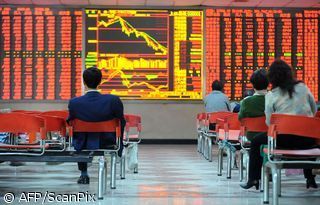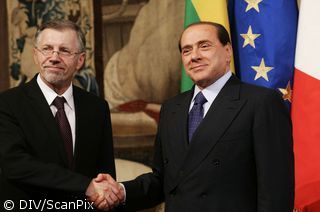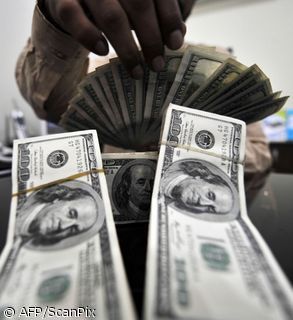It is the only source that can provide a chance for economic breakthrough
Published:
21 March 2005 y., Monday
Money from Russia’s Stabilisation Fund is expected to be invested abroad in dollar-nominated securities, with minimum investment risks and minimum profitability at 2-4%. These funds have until now been kept in Central Bank accounts. This means that a great deal of money will soon appear on the financial markets. On February 1, 2005, the Fund totaled 647.2 billion roubles ($23.1 billion), which mostly came from taxes on oil sales with prices exceeding $20 per barrel and export duties from oil companies.
The crucial question is how this money should be used. Money can only be taken out of the Fund when it has more than 500 billion roubles. Therefore, more than a fifth of its resources can already be used. This is a key issue for Russia’s economy, as the positive overseas market situation in recent years has been almost exclusively responsible for its growth.
However, experts are not tired of repeating that the potential of the resource-oriented Russian economy has been virtually exhausted. The mechanism whereby "we produce oil, sell it and enjoy the benefits" is becoming increasingly less effective. The country is now at a stage when it must introduce an industrial policy. However, any policy only makes sense when there is money to implement it.
Russia’s stock market and banking system do not provide the necessary financing for the real sector of the economy. Direct foreign investment in Russia remains at a very low level, while foreign investment in general is concentrated on either the import of equipment or foreign borrowings. The country obviously needs sources for further growth. The Stabilisation Fund is virtually the only potential source today and a genuine war is being waged for its funds.
Šaltinis:
financialexpress.com
Copying, publishing, announcing any information from the News.lt portal without written permission of News.lt editorial office is prohibited.
The most popular articles
 The EU should act in a united fashion to tackle the financial market crisis, and Member States should avoid unilateral steps which cause problems for their neighbours, according to most of the MEPs taking part in the debate on next week's EU summit and the financial turmoil.
more »
The EU should act in a united fashion to tackle the financial market crisis, and Member States should avoid unilateral steps which cause problems for their neighbours, according to most of the MEPs taking part in the debate on next week's EU summit and the financial turmoil.
more »
 Following the decision by the Economic and Financial Affairs Council (ECOFIN), the Government of Lithuania raises deposit guarantee protection for individuals from EUR 22,000 up to EUR100,000, demonstrating the credibility of Lithuanian finance sector and safety of deposits at financial institutions.
more »
Following the decision by the Economic and Financial Affairs Council (ECOFIN), the Government of Lithuania raises deposit guarantee protection for individuals from EUR 22,000 up to EUR100,000, demonstrating the credibility of Lithuanian finance sector and safety of deposits at financial institutions.
more »
 As banks tumble like bowling pins and confidence plummets, Thursday sees MEPs consider whether to back wider financial regulation.
more »
As banks tumble like bowling pins and confidence plummets, Thursday sees MEPs consider whether to back wider financial regulation.
more »
 On 6 October, the Embassy of Latvia to Lithuania received a reply to the note of Latvian Ministry of Foreign Affairs regarding the ruling of Vilnius District Court pertaining to the Latvian company airBaltic and Riga’s airport on the basis of the request of the Lithuanian company flyLAL.
more »
On 6 October, the Embassy of Latvia to Lithuania received a reply to the note of Latvian Ministry of Foreign Affairs regarding the ruling of Vilnius District Court pertaining to the Latvian company airBaltic and Riga’s airport on the basis of the request of the Lithuanian company flyLAL.
more »
 Lithianian Development Agency in cooperation with the Lithuanian Embassy to the United Kingdom of Great Britain and Northern Ireland as well as Alro Group, a real estate investment consultant, based in London, present “The Lithuanian Economic Forum” which will take place on October 8 in London.
more »
Lithianian Development Agency in cooperation with the Lithuanian Embassy to the United Kingdom of Great Britain and Northern Ireland as well as Alro Group, a real estate investment consultant, based in London, present “The Lithuanian Economic Forum” which will take place on October 8 in London.
more »
 Italian Prime Minister Silvio Berlusconi thinks that the closedown of Ignalina NPP might be postponed and affirmed this opinion to Lithuanian Prime Minister Gediminas Kirkilas who is presently on a working visit to Rome.
more »
Italian Prime Minister Silvio Berlusconi thinks that the closedown of Ignalina NPP might be postponed and affirmed this opinion to Lithuanian Prime Minister Gediminas Kirkilas who is presently on a working visit to Rome.
more »
 Open Collaboration Portfolio Integrates Cisco Unified Communications, Cisco TelePresence and Cisco WebEx.
more »
Open Collaboration Portfolio Integrates Cisco Unified Communications, Cisco TelePresence and Cisco WebEx.
more »
 Wincor Nixdorf's portfolio of software solutions for the branch business of postal services providers, PC/E Postal Solution Suite, has been newly structured and expanded to include additional functionalities.
more »
Wincor Nixdorf's portfolio of software solutions for the branch business of postal services providers, PC/E Postal Solution Suite, has been newly structured and expanded to include additional functionalities.
more »
 Session to Focus on How Enterprises Can Proactively Reduce Risk.
more »
Session to Focus on How Enterprises Can Proactively Reduce Risk.
more »
 The revised GDP growth rate in II quarter 2008 equalled 5.2 per cent.
more »
The revised GDP growth rate in II quarter 2008 equalled 5.2 per cent.
more »